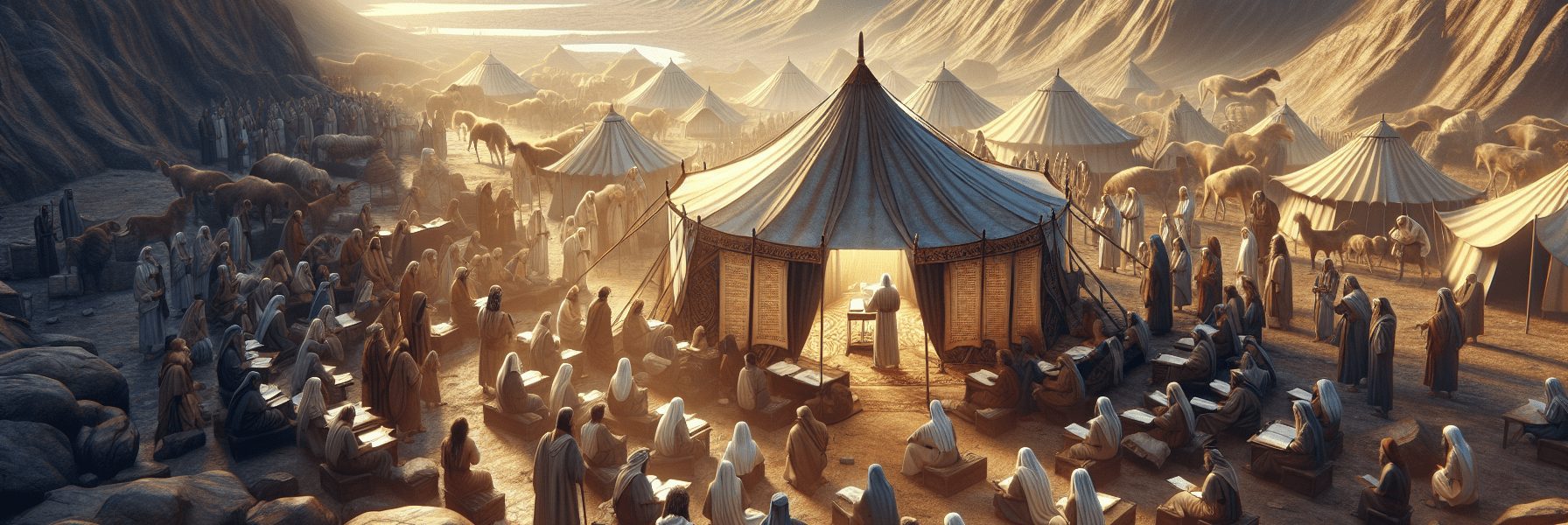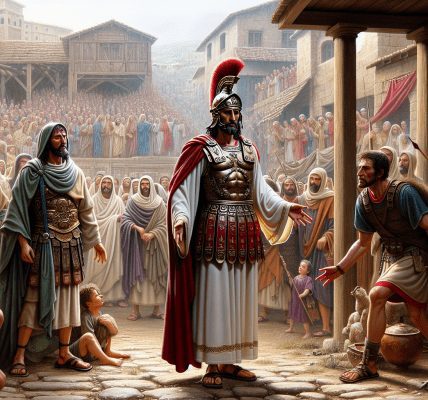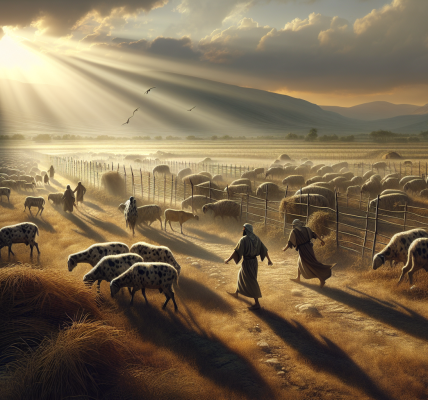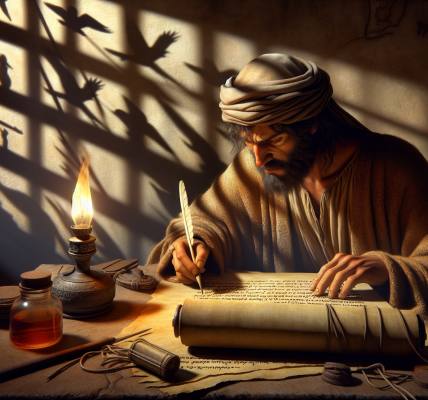**Title: The Law and the Covenant: A Story of Justice and Mercy**
The sun had barely risen over the horizon, casting golden hues across the rugged wilderness of Sinai. The Israelite camp was alive with the sounds of morning—children laughing, animals stirring, and the distant murmur of voices as families prepared for the day. At the center of it all stood the Tent of Meeting, where Moses had spent many long nights in the presence of the Lord, receiving the laws that would shape the nation.
Today was no ordinary day. The people had gathered in a wide semicircle around Moses, their faces a mixture of reverence and curiosity. The air was thick with anticipation as Moses unrolled a scroll, his voice steady and commanding.
**”These are the ordinances you shall set before them,”** he began, his words carrying the weight of divine authority. The people leaned in, knowing that the laws he was about to proclaim would govern their lives, ensuring justice and righteousness in their midst.
### **Theft and Restitution**
**”If a man steals an ox or a sheep and slaughters or sells it,”** Moses declared, **”he shall repay five oxen for the ox and four sheep for the sheep.”**
A murmur spread through the crowd. A burly shepherd named Joram shifted uncomfortably, recalling a time when his own flock had been raided by thieves. The law was severe, but it made sense—theft was not merely an offense against man, but against God, who had entrusted His people with possessions.
A young man named Eliab, listening intently, thought of his father’s words: *”The Lord does not tolerate dishonesty. He demands restitution, not just punishment.”* The penalty was steep—fivefold for an ox, fourfold for a sheep—because these animals were not just property; they were livelihoods.
### **The Thief Who Comes in the Night**
Moses continued, **”If a thief is found breaking in and is struck so that he dies, there shall be no bloodguilt for him. But if the sun has risen on him, there shall be bloodguilt.”**
A widow named Miriam clutched her shawl tighter. She had heard stories of thieves creeping into homes under cover of darkness. The law was clear—if a man killed a thief at night, he was not guilty, for he could not know the intruder’s intent. But in daylight, when mercy and restraint could be shown, bloodshed was a grave matter.
A seasoned warrior, Caleb, nodded in agreement. *”Justice must be tempered with wisdom,”* he thought. *”The Lord values life, even that of a thief, if there is room for mercy.”*
### **Responsibility for Property**
**”If a man causes a field or vineyard to be grazed over, or lets his beast loose to feed in another man’s field,”** Moses proclaimed, **”he shall make restitution from the best in his own field and vineyard.”**
A farmer named Asher winced, remembering a time when his neighbor’s goats had strayed into his barley, trampling the tender shoots. The law demanded fairness—what was lost must be repaid from the best of what remained.
### **The Fire That Spreads**
**”If fire breaks out and catches in thorns so that stacked grain or standing grain or the field is consumed,”** Moses continued, **”he who started the fire shall make full restitution.”**
A memory flashed in the mind of a laborer named Ezra—how a careless spark from a cooking fire had once set a nearby field ablaze. The law held him accountable, not just for the flames, but for the negligence that allowed them to spread.
### **Trust and Responsibility**
Moses’ voice grew even more solemn as he spoke of matters of trust. **”If a man gives his neighbor money or goods to keep safe, and it is stolen from the man’s house, then, if the thief is found, he shall pay double.”**
A merchant named Reuben exchanged glances with his brother. They often entrusted goods to one another when traveling. The law protected such trust—if a thief was caught, he paid double. But if no thief was found, the keeper of the goods had to swear before the Lord that he had not taken them himself.
**”For every breach of trust,”** Moses said, **”whether it is for an ox, a donkey, a sheep, a cloak, or any lost thing, the case of both parties shall come before God. The one whom God condemns shall pay double to his neighbor.”**
### **The Vulnerable and the Oppressed**
Then Moses’ tone softened, but his words carried no less weight. **”You shall not wrong a sojourner or oppress him, for you were sojourners in the land of Egypt. You shall not mistreat any widow or fatherless child.”**
A hush fell over the assembly. The memory of Egypt—the bitterness of slavery, the cries of the oppressed—was still fresh. An elderly Levite named Aaron bowed his head, his heart stirred with compassion. The Lord had not forgotten the weak, and neither must His people.
**”If you do mistreat them,”** Moses warned, **”and they cry out to me, I will surely hear their cry, and my wrath will burn, and I will kill you with the sword, and your wives shall become widows and your children fatherless.”**
A young mother, Ruth, clutched her child closer. The law was not just about punishment—it was a reminder that God Himself was the defender of the helpless.
### **Lending and Pledges**
**”If you lend money to any of my people with you who is poor,”** Moses continued, **”you shall not be like a moneylender to him, and you shall not exact interest from him.”**
A wealthy landowner named Boaz felt the weight of these words. He had often lent grain to struggling families in lean years. The law forbade profiting from their hardship.
**”If ever you take your neighbor’s cloak in pledge,”** Moses said, **”you shall return it to him before the sun goes down, for that is his only covering.”**
A humble weaver named Hannah thought of the cold desert nights. To take a man’s cloak was to leave him shivering. The law demanded compassion even in transactions.
### **The Holiness of the People**
Finally, Moses raised his hands, his voice ringing with divine authority. **”You shall be consecrated to me. Therefore you shall not eat any flesh that is torn by beasts in the field; you shall throw it to the dogs.”**
The people understood—this was not just about food, but about holiness. They were set apart, called to live differently, to reflect the purity of their God.
### **A Covenant Remembered**
As the assembly dispersed, the people carried the words with them, turning them over in their hearts. These were not just rules—they were the heartbeat of a covenant, a way of life that honored God and loved neighbor.
And above all, they remembered the God who had brought them out of Egypt, the God who was just and merciful, who demanded righteousness but also provided grace.
For the law was not just about justice—it was about shaping a people who would reflect the very character of Yahweh.
And so, under the vast desert sky, Israel took another step toward becoming the holy nation they were called to be.




